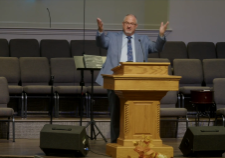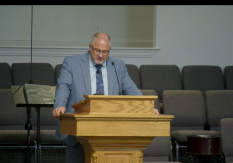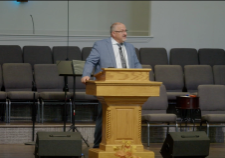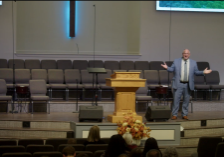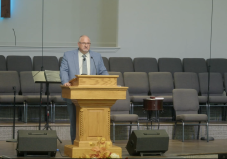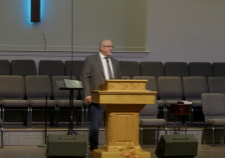The podcast episode emphasizes the unwavering nature of God’s faithfulness, underscoring that, unlike the world around us, which is constantly changing, God remains the same. The speaker reflects on Psalm 77, illustrating how the psalmist passes through moments of despair yet ultimately remembers God’s past wonders and steadfastness. This serves as a reminder that, despite the trials and uncertainties of life, individuals can find comfort in God’s consistent character and the hope it brings. The discussion encourages listeners to contemplate and acknowledge the faithfulness of God in their own lives, particularly during challenging times. By recalling God’s past actions and promises, they can cultivate a deeper trust in His unchanging nature and find peace amid life’s fluctuations.
Takeaways:
- Speaker A emphasizes the importance of remembering God’s faithfulness, especially during challenging times when one may feel discouraged or overwhelmed.
- In discussing Psalm 77, Speaker A highlights how the psalmist expresses sorrow but ultimately finds hope in recollecting God’s past deeds and faithfulness.
- Speaker A points out that God is immutable, meaning He never changes, and thus His faithfulness can be relied upon consistently throughout life.
- The speaker encourages listeners to contemplate God’s faithfulness, especially when faced with life’s uncertainties, as a source of hope and assurance.
Transcript
Amen.
Speaker A:Well, this morning a new song I'd never heard.
Speaker A:And then tonight, a new song I've never heard.
Speaker A:Appreciate the music today.
Speaker A:It's been such a blessing.
Speaker A:If you wouldn't your Bibles tonight turn to Psalm 77.
Speaker A:No, no Daniel tonight.
Speaker A:Psalm 77, and a lot of people out too, tonight and this morning already began their summer vacations.
Speaker A:As a member of our church family in prayer tonight, I wanted just to give you hopefully an encouraging word, a reminder of God's faithfulness.
Speaker A:Aren't you glad God's faithful?
Speaker A:God is so good and so faithful to us.
Speaker A:And we have studied this attribute.
Speaker A:We touched on it even last year again.
Speaker A:But I want to bring it tonight again in Psalm 77.
Speaker A:Let's go ahead and read.
Speaker A:Let's start in verse one.
Speaker A:It kind of gets sad and then it gets glad.
Speaker A:So kind of stay with me here.
Speaker A:The psalmist says, I cried unto God with my voice, even unto God with my voice.
Speaker A:And and he gave ear unto me.
Speaker A:In the day of my trouble I sought the Lord.
Speaker A:My sore ran in the night and ceased not.
Speaker A:My soul refused to be comforted.
Speaker A:I remembered God and was troubled.
Speaker A:I complained and my spirit was overwhelmed.
Speaker A:Now again, Selah means to stop and consider what's been said.
Speaker A:Now remember, these are songs, these are words to be sung.
Speaker A:Verse 4.
Speaker A:Thou holdest mine eyes.
Speaker A:Waking, I am so troubled that I cannot speak.
Speaker A:I have considered the days of old, the years of ancient times.
Speaker A:I call to remembrance my song in the night I commune with my own heart and my spirit made diligent search now notice what he asks.
Speaker A:Will the Lord cast off forever?
Speaker A:And will he be favorable?
Speaker A:No more in his mercy cling gone forever?
Speaker A:Doth his promises fail forevermore?
Speaker A:Hath God forgotten to be gracious?
Speaker A:Hath he in anger shut up his tender mercies?
Speaker A:Again, Selah, stop and consider.
Speaker A:Has God forgotten?
Speaker A:Has he forgotten me?
Speaker A:He said, I stay up at night, I can't sleep.
Speaker A:I'll just summarize.
Speaker A:I'm stressed, discouraged.
Speaker A:Verse 10 and I said, this is mine infirmity.
Speaker A:But I will remember the years of the right hand of the Most High.
Speaker A:In the Old Testament, when you read the phrase the right hand of the Most High or the right hand of God, it's speaking of Christ.
Speaker A:It's speaking of power.
Speaker A:It's speaking of authority.
Speaker A:I will remember.
Speaker A:I will remember the Lord.
Speaker A:I will remember his right hand.
Speaker A:I will remember his power.
Speaker A:I'll remember his son.
Speaker A:I'll remember the Messiah.
Speaker A:Verse 11.
Speaker A:I will remember the works of the Lord.
Speaker A:Surely I will remember thy wonders of old.
Speaker A:I will meditate also of all thy work and talk of thy doings.
Speaker A:Thy way, O God, is in the sanctuary.
Speaker A:Who is so great a God as our God?
Speaker A:That's a good question, right?
Speaker A:Who is greater than our God?
Speaker A:No one.
Speaker A:No one.
Speaker A:Thou art the God that does wonders.
Speaker A:Thou hast declared thy strength among the people.
Speaker A:Thou hast with thine arm redeemed thy people, the sons of Jacob and Joseph.
Speaker A:The waters saw thee, O God.
Speaker A:The waters saw thee.
Speaker A:They were afraid.
Speaker A:The depths also were troubled.
Speaker A:The clouds poured out water.
Speaker A:The sky sent out a sound.
Speaker A:Thine arrows talking about, you know, thundering and lightning.
Speaker A:Thine arrows also went abroad.
Speaker A:Lightning.
Speaker A:The voice of thy thunder was in heaven.
Speaker A:The lightning light enlightened the world.
Speaker A:The earth trembled and shook.
Speaker A:The way is in the sea and thy path in the great waters and thy footsteps are known.
Speaker A:Thou ledest thy people like a flock by the hand of Moses and Aaron.
Speaker A:Let's talk about the faithfulness of God for a few minutes after we pray.
Speaker A:Heavenly Father, we thank you, Lord, for your faithfulness, that you are immutable, that you never change.
Speaker A:God, we thank you for that hope that we have in you.
Speaker A:In Jesus name, Amen.
Speaker A:I don't know about you, but around us we live in a very changing world.
Speaker A:At any moment, things change, you know, the financial circumstances change, schools change, families change, our government changes.
Speaker A:And what a time we live in.
Speaker A:As I said this morning, as fast as pace as everything is, it changes overnight.
Speaker A:Sometimes you get up in the morning and you read whatever you read.
Speaker A:I still go to Fox News on my little app and look and see what happened last night.
Speaker A:Well, change is taking place.
Speaker A:But I'm thankful that God never changes.
Speaker A:I'm thankful that he is faithful and God is faithful.
Speaker A:He is the same.
Speaker A:The Bible says he's the same today, yesterday and forever.
Speaker A:Malachi 3, 6 says, I am God.
Speaker A:I change not.
Speaker A:I change not again.
Speaker A:His immutability or his immutability.
Speaker A:I can hardly say that again.
Speaker A:His never.
Speaker A:He cannot change.
Speaker A:And therefore he has to be faithful.
Speaker A:He has to be faithful.
Speaker A:In other words, his immutability presupposes that he is faithful.
Speaker A:Because if he was faithful yesterday and he's immutable, then he has to be faithful today or else he's changed.
Speaker A:I change from day to day.
Speaker A:I might be faithful today, but I might not be faithful tomorrow.
Speaker A:I mean, again, it's Monday tomorrow.
Speaker A:Tomorrow I will strive to eat right.
Speaker A:And I'll strive tomorrow to walk in exercise every Monday.
Speaker A:Every Monday I'd never give up.
Speaker A:My wife, she'll say it, I never give up.
Speaker A:I'll keep trying.
Speaker A:I'll keep trying.
Speaker A:It'll stick for a little while and I'll keep trying.
Speaker A:But I may eat right for a couple of days and exercise a couple of days, and then I.
Speaker A:No longer faithful.
Speaker A:No longer faithful, right, And I'm being silly, but I'm so thankful that I have a God who is faithful.
Speaker A:I'm so thankful that I have someone whom I can depend upon.
Speaker A:I'm telling you, we know this.
Speaker A:In this day and age, especially, you can't depend upon your job.
Speaker A:Most businesses are no longer faithful to their employees, man.
Speaker A:That goes the other way too.
Speaker A:In this dynamic of the Internet and job search and headhunters, it's also the employees that are not as faithful as they were in times past.
Speaker A:Things change.
Speaker A:Times change.
Speaker A:And I'm thankful again, God never changes.
Speaker A:God is faithful.
Speaker A:And in that faithfulness is hope.
Speaker A:And that faithfulness is hope.
Speaker A:In other words, I'm hoping that I stick with eating right and exercising this week.
Speaker A:But the likelihood of that happening is not good.
Speaker A:The percentage of that happening is not very good.
Speaker A:But again, my hope in God is far different.
Speaker A:My hope in him is absolute because he is immutable and because he never changes, I can put my trust in him.
Speaker A:I can put my trust in him today, tomorrow, and the next day.
Speaker A:How do I know practically I can do that?
Speaker A:Well, the psalmist tells you, because I can look back and I can see the wonders of God.
Speaker A:I can see what God has done in my own life and what he's done in others lives, knowing that God is faithful in the past and he'll be faithful in the future.
Speaker A:But sometimes we have a tendency to forget God's faithfulness.
Speaker A:We have a tendency to get narrow, you know, focus narrowly on our problems and on the changes that are taking place.
Speaker A:Life is changing constantly, but God never changes again.
Speaker A:The danger we face today is forgetting God's faithfulness.
Speaker A:You know, Israel did that.
Speaker A:Israel forgot God's faithfulness over and over and over again.
Speaker A:In fact, one of the.
Speaker A:One of the reasons why we have the Book of Psalms, which is a book of songs, was for Israel to learn these songs.
Speaker A:And in a lot of these songs is the reminder of what God has done for Israel.
Speaker A:Look at Psalm 78.
Speaker A:He says, Give ear, O my people, to my law.
Speaker A:Incline your ears to the words of my mouth.
Speaker A:I will open my mouth in a parable.
Speaker A:I will utter dark sayings of old which we have heard and Our fathers have told him we will not hide them from their children, showing to the generation to come the praises of the Lord and his strength and his wonderful works that he hath done.
Speaker A:For he established a testimony in Jacob and appointed a law in Israel, which he commanded our fathers that they should make them known to their children, that the generation to come might know them.
Speaker A:Even the children which should be born, who should arise and declare them to their children.
Speaker A:Why, that they might set their hope in God and not forget the works of God, but keep his commandments again being reminded over and over and over again of the wonders God and his faithfulness to his people.
Speaker A:His faithfulness to you, his faithfulness to me.
Speaker A:I think again about the book of Joshua where he says, be strong and of good courage.
Speaker A:Be not afraid, be not dismayed.
Speaker A:I will what be with you.
Speaker A:I will never leave you nor forsake you.
Speaker A:We serve a faithful God.
Speaker A:Sometimes we just again have a one track mind.
Speaker A:Devil will get us focused on our problems.
Speaker A:He'll get us focused on the changes that are taking place.
Speaker A:And maybe those are negative.
Speaker A:Y' all have heard Brother Stewart use this illustration.
Speaker A:Maybe if you remember him, a father fell asleep, and while he was sleeping, one of his kids took some Limburger cheese and rubbed it underneath his nose.
Speaker A:How many of y' all had your mom or dad rub Vaseline under your nose?
Speaker A:That's witchcraft.
Speaker A:Then they say, well put.
Speaker A:I'm sorry, not Vaseline, but the Vicks.
Speaker A:Vicks Vapor Rub, right?
Speaker A:You put that Vicks on your.
Speaker A:That's witchcraft.
Speaker A:But then they say, well, put that on your feet.
Speaker A:That's witchcraft.
Speaker A:I mean, might as well just go in the.
Speaker A:Might as well go in the back porch and get your cauldron out and start stirring it.
Speaker A:Throw in a few wing bats and spider tails or whatever.
Speaker A:Spider legs.
Speaker A:Anyway, dad, little kid put Limburger cheese on his right under his nose.
Speaker A:And the dad woke up that morning and, man, it stank.
Speaker A:He said, he got up.
Speaker A:He got up and he said, man, this.
Speaker A:This room stinks.
Speaker A:And then he walked into the living room.
Speaker A:This living room stinks.
Speaker A:And then he goes into the kitchen.
Speaker A:He says, this.
Speaker A:This kitchen stinks.
Speaker A:And then finally goes outside, he says, the world stinks.
Speaker A:I think sometimes we feel the same way, don't we?
Speaker A:We really do.
Speaker A:The whole world stinks.
Speaker A:And so many times when things come into our life, we have a tendency again to look upon the negative and the problem, because that's what the devil wants.
Speaker A:As I said this morning, one of his biggest tools in the toolbox is discouragement.
Speaker A:That's why again, God told Joshua, be not dismayed, don't be discouraged.
Speaker A:And as the devil gets you to look on all the problems and all the distractions and all the detours in life and we need to be reminded that God is faithful.
Speaker A:That God is faithful.
Speaker A:If you don't, if you're not careful, you'll again you'll say the world stinks.
Speaker A:And you think your job stinks.
Speaker A:And then all of a sudden you look at your family, God forbid, but you say my family.
Speaker A:And you just keep on down and find yourself again in a position of forgetting the faithfulness of God.
Speaker A:The.
Speaker A:The next time you find yourself in a trial, don't blame, but contemplate the faithfulness of God.
Speaker A:Again, the old hymn, that's just such a great hymn.
Speaker A:Count your blessings, name them one by one and you'll see what God has done.
Speaker A:I'm telling you the faithfulness of God.
Speaker A:Why is God faithful?
Speaker A:Well, he's faithful because he forgets.
Speaker A:I've had preachers and commentators, I've looked this up and you know, the Bible talks about that God forgives our sins and forgets them.
Speaker A:Now I can forgive someone, but I cannot forget.
Speaker A:Well, the commentator will say the summary of that.
Speaker A:It really doesn't mean he forgets.
Speaker A:Forgets it.
Speaker A:It just means that, you know, that he puts it away.
Speaker A:My Bible says he forgets it.
Speaker A:As a human being, I cannot forget.
Speaker A:But apparently as the divine, as one who is wholly other, he can forget.
Speaker A:It's an amazing thought.
Speaker A:Do you realize again the faithfulness of God and he's faithful because he forgets.
Speaker A:He forgets what?
Speaker A:Well, he forgets our sins.
Speaker A:I'm so thankful I'm saved.
Speaker A:Aren't you?
Speaker A:I'm thankful my sins have been for forgiven.
Speaker A:I'm thankful my sins have been thrown into the depths of the sea, never to be remembered anymore.
Speaker A:My sins have been thrown as far as the east is from the west.
Speaker A:My sins have been covered by the blood.
Speaker A:God doesn't see my sin, he's forgotten my sin.
Speaker A:Hebrews 8:12 says they've been forgiven and forgotten and covered by the blood that he, he that is Christ is the propitiation for my sins.
Speaker A:The covering pitch, the root word pitch.
Speaker A:You think about Noah's ark and it says they pitched it without and within.
Speaker A:They covered the ark without an end with pitch.
Speaker A:Covered it.
Speaker A:That's the way my sins have been covered.
Speaker A:But not covered in slimy, whatever that was, waterproofing seal.
Speaker A:But covered by the blood of Jesus.
Speaker A:God is faithful.
Speaker A:God is gracious.
Speaker A:He does not give me what I deserve.
Speaker A:Amen.
Speaker A:I don't deserve heaven.
Speaker A:I deserve hell because of my sins.
Speaker A:I don't deserve the Holy Spirit, but He gives it to me.
Speaker A:I don't deserve his love, and yet he loves me.
Speaker A:I don't deserve the presence and power that he gives us, but he does.
Speaker A:God is gracious.
Speaker A:Getting what I do not deserve.
Speaker A:I'm thankful.
Speaker A:He withholds punishment.
Speaker A:He shows mercy.
Speaker A:Mercy I deserve.
Speaker A:Again, I deserve hell.
Speaker A:But God, in his mercy, God is faithful to forget.
Speaker A:Secondly, God is faithful to feed.
Speaker A:God is faithful to feed.
Speaker A:Again, the scripture there is First Peter.
Speaker A:I'm going to turn over there real quick.
Speaker A:First Peter, chapter two says, wherefore.
Speaker A:Sorry, Verse one.
Speaker A:Man, Larry showed up just like two seconds.
Speaker A:That was something.
Speaker A:Larry's My cough.
Speaker A:Wherefore.
Speaker A:Verse one, one Peter two.
Speaker A:One, Wherefore.
Speaker A:Laying aside all malice and all guile and all hypocrisies and nimbies and all evil speakings as newborn babes desire the sincere miracle of the word that ye may grow thereby if so be ye have tasted that the Lord is gracious.
Speaker A:The Lord is gracious.
Speaker A:The Lord is faithful to feed.
Speaker A:A newborn needs to be fed in order to grow.
Speaker A:A toddler needs to be fed in order to grow.
Speaker A:A child grows as they are fed.
Speaker A:We as Christians understand that Jesus said there to the woman at the well, you must be born again.
Speaker A:And we are born again spiritually.
Speaker A:And when we're born again, we're born as babes spiritually.
Speaker A:And that sanctification, that process whereby we become more and more like Christ begins.
Speaker A:And that process, in other words, the growth takes place by being fed and being fed by the word of God, the sincere milk of the word.
Speaker A:The Bible also is referred to as meat and strong meat.
Speaker A:And as we read our Bibles, as we pray, we grow because that's our spiritual sustenance.
Speaker A:That's how we grow in the knowledge of the Lord Jesus Christ.
Speaker A:By reading the Bible, many Christians push away from God's food and desire the world's food.
Speaker A:It's amazing to me how again, I was.
Speaker A:Why do we always come back to eating illustrations?
Speaker A:I don't know.
Speaker A:Maybe because I have a problem.
Speaker A:But, you know, it's amazing to me how good chocolate cake tastes.
Speaker A:And if you put chocolate cake in front of me and you put trying to think of something I don't like, I don't.
Speaker A:I like everything.
Speaker A:That's the problem.
Speaker A:But if you put chocolate cake in front of me, and you put broccoli in front of me.
Speaker A:I like broccoli, but I like chocolate cake far better.
Speaker A:Can I get a witness or cake in general?
Speaker A:Maybe sometimes you don't.
Speaker A:Maybe some of you don't like chocolate.
Speaker A:But again, if I'm going to choose between broccoli and a dessert, and I have the choice, and I'm not basing it upon what is good for me, I'm going to choose the dessert every time.
Speaker A:And what happens in our Christian life is we begin to get.
Speaker A:And when we get saved, when we accept Christ as our savior, the newborn babe desires the milk of the word.
Speaker A:And you begin to read the Bible and begin to pray, and you go to services and you find yourself enjoying Christian music and the words of the Christian music and enjoying the revival meetings and the Bible conferences and missions conferences.
Speaker A:And you began to grow.
Speaker A:And you began to grow.
Speaker A:But you also have that other, other food over here.
Speaker A:And the food of the world is the music that you listen to on the way to work and the stories you hear at work and just the TV and movies and being bombarded by what the world has to offer when it comes to food.
Speaker A:And the old flesh, boy, it craves some of those things.
Speaker A:My flesh craves chocolate cake over broccoli.
Speaker A:But I do know broccoli's better for me.
Speaker A:It doesn't mean I like that idea, but it does.
Speaker A:And therefore, I make the right choices.
Speaker A:I strive to make the right choices.
Speaker A:I'll say it that way.
Speaker A:Amen.
Speaker A:Come on, you guys.
Speaker A:All of us are that way.
Speaker A:When it comes to my spirituality, too, I have to make the right choices.
Speaker A:And I will say this.
Speaker A:And I have.
Speaker A:I have gone without dessert or amazing, amazing sweets one time.
Speaker A:I did it for nine months.
Speaker A:And I will say to you that during those nine months, some of you have experienced this.
Speaker A:When you go without a lot of sugar for that long, you find that the other food tastes better.
Speaker A:How many?
Speaker A:All of us.
Speaker A:I mean, if you've tried, if you struggle like me, there's several of you shaking your head no.
Speaker A:I understand what you're saying, because chocolate cake's always going to taste better than broccoli.
Speaker A:But it will.
Speaker A:You will.
Speaker A:You will.
Speaker A:As you eat less sugar, your taste buds change a little bit.
Speaker A:I'm just telling you this.
Speaker A:If you don't desire God's word anymore, if it's not.
Speaker A:If it's not appetizing to you, then there's something wrong.
Speaker A:As a child of God, the Holy Spirit who abides in you, that new nature desires the milk of the Word it desires.
Speaker A:The meat of the Word, it desires to be fed.
Speaker A:And when you feed it, when you feed that new nature and you feed that new man in you man, then it begins to grow, and it begins to grow, and it begins to grow.
Speaker A:Just want to encourage you tonight.
Speaker A:The Bible is our food.
Speaker A:And it seems like this subject has come up a lot in the last three or four weeks.
Speaker A:How's your Bible read?
Speaker A:How's your devotional time?
Speaker A:How's your walk with God?
Speaker A:2nd Timothy 3:16.
Speaker A:You know the verse.
Speaker A:All scriptures given by inspiration to God is a prophet for doctrine, for correction, for instruction, doctrine, for reproof, for correction, for instruction in righteousness.
Speaker A:In other words, the Bible helps us to know what is right, helps us to what is not right, helps us how to get right and then how to stay right.
Speaker A:We need a daily walk with the Lord.
Speaker A:We need to be fed every day.
Speaker A:I don't like going without a meal, do you?
Speaker A:I don't like going without a meal.
Speaker A:I didn't even say it.
Speaker A:I don't like going without second supper or second lunch or brunch or leper.
Speaker A:I like it all lepers between lunch and supper.
Speaker A:As I desire physical food, I should desire spiritual food.
Speaker A:And it's important, it's important that we feed the new man again.
Speaker A:The Bible is our map, our roadmap for life.
Speaker A:God is faithful to forget.
Speaker A:God is faithful to feed us if we'll take advantage of it, if we'll take the opportunities of it.
Speaker A:And then lastly, God is faithful to forgive and forget and forgive, go alongside each other.
Speaker A:But I understand this.
Speaker A:Ephesians 1:7 says, Whom we have redemption through his blood, the forgiveness of sins according to the riches of his grace.
Speaker A:I'm thankful that God has forgiven me.
Speaker A:I'm thankful for the forgiveness of God.
Speaker A:God cannot change and therefore cannot be unfaithful.
Speaker A:We as human beings cannot be faithful because we are influenced by our circumstances.
Speaker A:We are influenced by fear.
Speaker A:Think about it.
Speaker A:God's never afraid.
Speaker A:We're influenced by our weaknesses.
Speaker A:We're influenced by losses.
Speaker A:We're influenced from without in every direction.
Speaker A:And therefore, unlike God, we cannot be faithful.
Speaker A:Oh, we may at times be faithful, but we're going to fall and we're going to fail.
Speaker A:But God never fails.
Speaker A:God is faithful.
Speaker A:God is not.
Speaker A:God is not phased by forces from without.
Speaker A:God is faithful.
Speaker A:God is faithful in his love.
Speaker A:At times.
Speaker A:I'm not faithful in my love, my love for loved ones and my wife and kids and church family.
Speaker A:I'm not faithful But God is always faithful in love.
Speaker A:He's always seeking the other more than Himself.
Speaker A:He's always putting others in front of Himself.
Speaker A:God is not phased by outside forces.
Speaker A:He is faithful in his love.
Speaker A:He's faithful in his justice.
Speaker A:He's never divided.
Speaker A:He is the all time equality expert.
Speaker A:Because God is no respecter of man.
Speaker A:Aren't you glad of that?
Speaker A:Aren't you glad he doesn't love someone more than he loves you?
Speaker A:God is faithful.
Speaker A:God's faithfulness brings peace and God's faithfulness brings assurance into our life.
Speaker A:God's faithfulness brings assurance of heaven into our life.
Speaker A:Think about that.
Speaker A:The hope that we have and the blessed hope of his return and knowing because of his immobility and his faithfulness that he will return because he's promised to do so.
Speaker A:There's no question.
Speaker A:It's just a matter of time.
Speaker A:The hope that we have becomes of faithfulness.
Speaker A:Great is thy faithfulness, O God, my father.
Speaker A:God is so faithful.
Speaker A:I want to encourage you tonight when you're tempted to be discouraged, when you're being tested, when you go through the trial and the devil tries to discourage you, remember the faithfulness of God.
Speaker A:Remember the hope that we have.
Speaker A:Remember that God's unlike anyone that you know.
Speaker A:He's not like your friend.
Speaker A:He's not like your co worker or your neighbor, your mom or your dad, your spouse.
Speaker A:Because all those people at one point will let you down.
Speaker A:All humans at one point or another will be unfaithful.
Speaker A:But God is always faithful.
Speaker A:Always.
Speaker A:Because God never changes.
Speaker A:God is good all the time.
Speaker A:God always has our best interests in mind.
Speaker A:And though many times we as parents will discipline and train our children and we have good intentions and we do have their best interests in mind most of the time.
Speaker A:But sometimes we fail even in that area.
Speaker A:But God never fails.
Speaker A:He always, always, always has your best interests in mind.
Speaker A:So whatever you're going through tonight, whatever you face, by the way, whether good or bad, God has your best interest in mind.
Speaker A:Because God is faithful.
Speaker A:He never changes.
Speaker A:He's always the same.
Speaker A:And God always keeps his word.
Speaker A:And therefore we have hope in Him.
Speaker A:The greatest hope we have is in Jesus Christ and He is faithful to his promises.
Speaker A:Let's all stand.
Speaker A:We're going to sing a verse hymn 167, just as I am tonight.
Speaker A:It's a reminder of the faithfulness of God.
Speaker A:Faithfulness of God.
Speaker A:Heavenly Father, we thank you for your faithfulness.
Speaker A:We thank you that through your faithfulness we find hope in your son, Jesus Christ.
Speaker A:I'M so thankful that you do forget.
Speaker A:And Lord, that you do feed us through your word and encourage us and grow us.
Speaker A:And I pray Lord, that you continue to enable us and strengthen us.
Speaker A:And Lord, we thank you for your forgiveness, the grace that you so richly bestow upon us, the mercy that you give to us.
Speaker A:Lord, thank you for your faithfulness.
Speaker A:In Jesus name, amen.
Notice a problem?
Our sermon archive represents hundreds of hours of cataloging and dedication by staff and volunteers, but we do not always get things right. Report wrong preachers, titles, or mismatched videos here.

